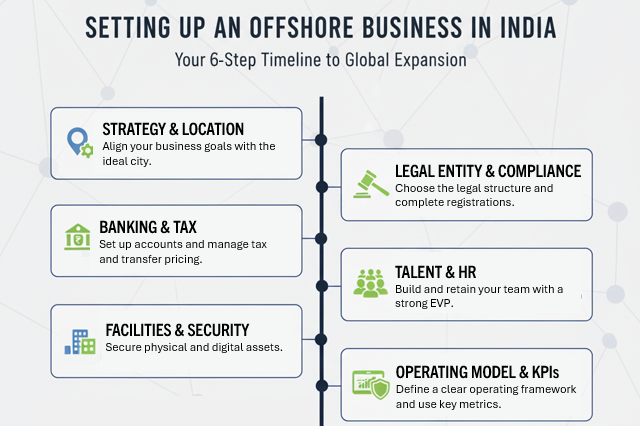Build an Offshore Business in India
The decision to build a business presence in India is a fundamental business model choice that requires a thorough understanding of the available operational models and the legal and compliance landscape.
The key question for global leaders is whether they have full transparency into the operational, legal, and workforce requirements needed to turn this aspiration into reality. Knowledge of these aspects is the foundation upon which a robust and future-proof offshore business can be constructed.

Strategic planning and location
A company’s success depends on aligning its operational goals with a specific city or region’s characteristics. The shift in global offshoring has gone beyond simple cost arbitrage to a focus on value creation, innovation, and results-based results.
City Selection Criteria
The choice of location is a key decision that affects everything from talent acquisition to operational costs and market access. The Indian ecosystem offers a variety of options, broadly categorized into mature Tier 1 hubs and emerging Tier 2 cities.
Tier 1 Cities:
- Bengaluru and Hyderabad have established themselves as India’s leading GCC hubs, collectively driving more than 60% of total GCC demand between 2021 and 2025. Bengaluru retains its premier position due to a large talent pool and demand from technology, engineering, and manufacturing firms.
- Mumbai is a favoured location for front-end BFSI firms, while Pune attracts top financial firms due to its focus on cost-effectiveness.
Emerging Tier 2 Cities:
- Chennai is estimated to see the highest jump in GCC leasing in 2025, with 5x times more than in 2021. This growth is attributed to affordable rentals and a focus on expanding into high-value operations.
- Other emerging hubs like Indore, Jaipur, and Coimbatore offer lower costs and gain prominence as IT hubs. These cities benefit from lower cost of living and strong government support, attracting both entrepreneurs and investors.
The decision between a Tier 1 and Tier 2 city is a direct function of business objectives. An organization focused on cutting-edge research and development that requires a large, multi-disciplinary talent pool may find a Tier 1 city like Bengaluru or Hyderabad to be a better fit. If a company prioritizes cost optimization may find the value proposition of a Tier 2 city more appealing. This careful alignment of location with business intent is crucial for long-term success.
Legal Entity and Compliance Setup
The Indian regulatory environment, while complex, has been streamlined in recent years to facilitate foreign investment. A foreign corporation’s most common legal entity is a private limited company, which offers a separate legal identity and limits liability. Other options include a branch office or a liaison office, each with distinct advantages and constraints.
Registrations and Filings
After deciding on the legal structure, several mandatory registrations and filings must be completed. This process includes obtaining a Permanent Account Number (PAN) and a Tax Deduction and Collection Account Number (TAN), which are crucial for all financial transactions and tax-related activities.
Depending on the nature of the business, registration for the Goods and Services Tax (GST) is also required. Furthermore, the company must be incorporated with the Ministry of Corporate Affairs (MCA) by filing the required documents.
All local, state and national laws, including those related to environmental regulations and industry-specific licenses, are not negotiable to avoid penalties and ensure continuous operations.
Refer here for more information: How to register and setup a legal entity in India
Financials and Tax Management
Establishing a financial foundation in India involves setting up corporate bank accounts and navigating the country’s comprehensive tax framework. Foreign companies can open accounts with both local and international banks. Due to the high scrutiny on international transactions, choosing a reputable bank with a strong compliance record is paramount.
Treasury and Transfer Pricing
Managing treasury operations requires careful consideration of currency exchange regulations and fund repatriation. Of particular importance is transfer pricing, which governs transactions between a parent company and its Indian subsidiary. The Indian Income Tax Act, 1961, includes strict transfer pricing regulations based on the arm’s-length principle, ensuring that inter-company transactions are conducted at market rates.
If companies don’t keep meticulous documentation and handle their annual transfer pricing audits, they’re setting themselves up for real trouble. Tax authorities won’t hesitate to step in if there’s something off, and the penalties can sting big time. It’s just smart business to have experienced financial and legal pros on your side to help avoid messy disputes.
Talent Acquisition and HR
India possesses one of the world’s largest and most diverse talent pools. However, attracting and retaining top professionals requires a complex approach that goes beyond competitive compensation. A well-defined Human Resources (HR) framework and a compelling Employee Value Proposition (EVP) are critical for securing and retaining the necessary workforce.
EVP and Hiring Channels
A strong EVP encapsulates the unique benefits and opportunities an organization offers its employees. It must communicate more than just salary, focusing on career development, learning opportunities, work-life balance, and a positive corporate culture.
To reach the right candidates, companies should use a mix of recruitment channels, including executive search firms, professional network platforms, and college partnerships. Working with local recruiting agencies with deep industry knowledge can speed up the hiring process and ensure a good cultural fit, which is crucial to the long-term success of the offshore team.
Facilities and Security
The physical infrastructure of an offshore center plays an important role in operational efficiency and the protection of corporate assets. This includes securing office space and ensuring a high level of physical and digital safety.
Network and Access
A robust network infrastructure is essential for seamless connectivity with the parent firm and clients. This involves establishing a secure, high-speed network with layoffs to minimize downtime. Access control for the physical facility is equally important, requiring advanced security measures such as biometric access and surveillance systems.
For data and intellectual property, strict cyber security protocols are a must. This includes firewalls, encryption, and regular security audits to comply with global data protection standards such as the Digital Personal Data Protection Act (DPDP) in India and the General Data Protection Regulation (GDPR) in Europe, if applicable.
Operating Model and KPIs
A well-defined operating model ensures that the Indian offshore center is not just a back-office function but an integrated, value-driven component of the global organization. The model should outline roles, responsibilities and decision-making processes, fostering a culture of ownership and collaboration.
Cadence and Dashboards
To track performance and drive continuous improvement, leaders must establish a clear operational cadence. This includes regular review meetings, progress updates, and a consistent rhythm of communication among the offshore team and global stakeholders.
Key Performance Indicators (KPIs) are the metrics that measure the success of the offshore operations. These go beyond simple cost savings, including quality, productivity, innovation throughput, and time-to-market metrics.
These KPIs can be visualized on interactive dashboards that provide real-time insights into the center’s performance, enabling data-driven decision-making and aligning with overall business goals.
Conclusion
India offers one of the most dynamic environments for building offshore enterprises, with its combination of a skilled workforce, favorable policies, and robust infrastructure. However, success depends on much more than establishing a legal entity, it requires deliberate choices around location, compliance, financial management, talent strategy, and operational governance.
Partner with ANSR to align your business vision with India’s dynamic ecosystem and transform your offshore center into a true engine of innovation and value creation.




